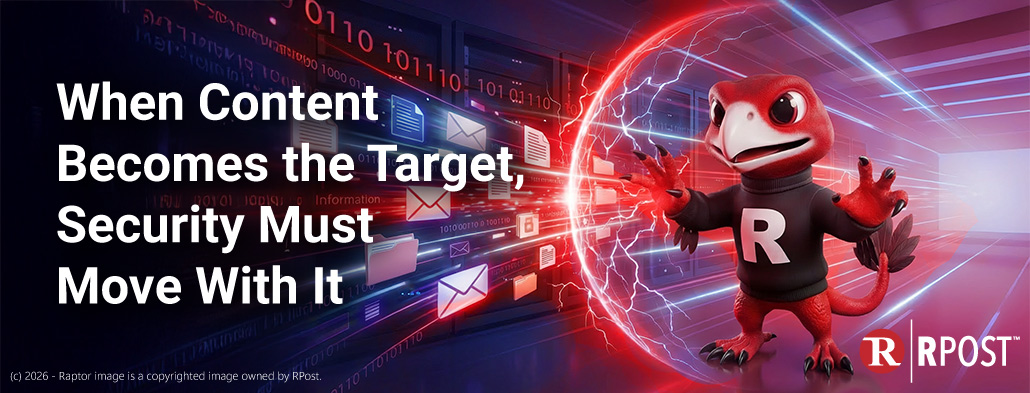
Has this happened to you recently: You get an email from yourself asking you to click a link to see an agenda you didn’t write or for an invoice you never sent? The newest are people sending you pictures of checks that they supposedly put in the mail to you (hoping you click on the image which then makes nefarious things happen). Earlier this week I saw an email from myself with an exact duplicate of my own RPost signature asking me to click a link to register for a long-past webinar and download a strange document that was titled, “PO#09162020.doc”.
Obviously, this email went straight to the trash, but there were probably dozens of internal and external people on the email who were bcc’d who may have unknowingly clicked on it, thereby unleashing who-knows-what kind of damage. And with so many employees still working from home and using their own broadband and laptops, there is very little in the way of security to prevent this from happening. This is what is keeping systems administrators around the world up at night since the pandemic began.
Know more:
As The Wall Street Journal mentioned in a recent article, corporate cybersecurity leaders are very concerned that it’s now easier for employees to unwittingly create openings for hackers using their own machines and systems for work. In addition, there’s also the potential for seemingly innocent behavior to open up risk — employees emailing passwords for access to business systems in plain text, staff taking photos of sensitive documents and emailing them as plain images from their phones since they don’t have scanners handy, or a host of other compromising activities that are done in the name of convenience (or just plain laziness or distraction).
However, the bulk of this new risk rests on the potential for email (on low or no-security systems) to be leveraged by hackers, and this work-from-home environment is making it more challenging for IT trainers to educate these out-of-sight staff on these risks. But here’s the good news: At Optimize! E-Sign E-Security, RPost’s virtual industry user conference (October 1, click to register free), RPost will be unveiling advancements in security automation: RMail Recommends™ and RMail Gateway™. These are designed precisely to tackle these issues.
RMail Recommends™ uses predictive technologies at the point of sending emails right inside Microsoft Outlook/Office 365 in the compose email interface to automate recommendations or requirements for users to encrypt, send Registered Email™ messages for proof of who said what when by email, or send for recipient e-signature. RMail Gateway™ is a cloud security gateway that specializes in providing the best user experience in automated outbound email encryption, tracking, proof of email compliance, and a lot more, triggered by predictive technologies, message content policies and rules – even if users are emailing from their mobile devices.
IT administrators who are leveraging one or more of these products are gaining greater confidence in their employees’ ability to adhere to security policies, and they have the ability to monitor RMail and RSign encryption usage, patterns, and security and compliance insights in real time inside RPortal. A recent customer mentioned that she noticed an employee named “Bill” only sent out 3 encrypted emails last week when he typically sends more than 50. This prompted the manager to contact Bill and perform a compliance check on “Bill’s” system. A tool that allows you to run usage reports is key in making sure that everyone is doing their best to protect customer information.
If you’d like to learn more about how RMail Recommends™ and RMail Gateway™ can help your company stay more secure, please register for our Optimize! E-Sign E-Security Live Virtual Conference on October 1. You will be able to learn much more about these products and interact with one of our product experts live. The bottom line is that working from home is going to be the norm well into next year for many businesses and keeping your employees and networks safe will continue to be a challenge.
.jpg)
February 13, 2026

February 06, 2026

January 30, 2026

January 23, 2026

January 16, 2026